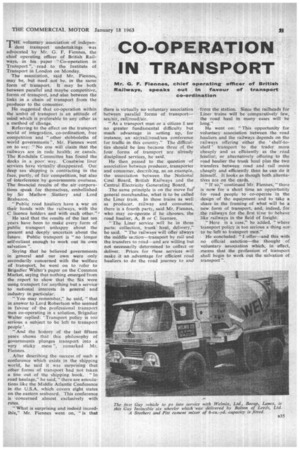CO-OPERATION IN TRANSPORT
Page 53

If you've noticed an error in this article please click here to report it so we can fix it.
Mr. G. F. Fiennes, chief operating officer of British Railways, speaks out in favour of transport co-ordination
THE voluntary association of independent transport undertakings was advocated by Mr. G. F. Fiennes, the chief operating officer of British Railways, in his paper "Co-operation in Transport ", read to the Institute of Transport in London on Monday.
The association, said Mr. Fiennes, may be, but need not be, in the same form of transport. It may be both between parallel and maybe competitive, forms of transport, and also between the links in a chain of transport from the producer to the consumer.
He suggested that co-operation within the ambit of transport is an attitude of mind which is preferable to any other as a method of change.
Referring to the effect on the transport world of integration, co-ordination, free competition and "other shibboleths of world governments", Mr. Hennes went on to say: "No one will claim that the railways are in rude health; or canals. The Rochdale Committee has found the docks in a poor way. Coastwise liner services have virtually disappeared. Our deep sea shipping is contracting in the face, partly, of fair competition, but also of interference by governments overseas. The financial results of the air corporations speak for themselves, embellished by Sir Mathew Slattery and Lord Brabazon.
"Public road hauliers have a war on their hands with the railways, with the C licence holders and with each other."
He said that the results of the last ten years have been to make every form of public transport unhappy about the present and deeply uncertain about the future. Public transport is "no longer self-reliant enough to work out its own salvation ".
Saying that he believed governments in general and our own were only secondarily concerned with the welfare of transport, he went on to refer to Brigadier Walter's paper on the Common Market, saying that nothing emerged from the report to show that the Six were using transport for anything but a service to national interests in general and industry in particular.
"You may remember," he said, "that in answer to Lord Robertson who seemed in favour of the professional transport men co-operating in a solution, Brigadier Walter replied: 'Transport policy is too serious a subject to be left to transport people '.
"And the history of the last fifteen years shows that this philosophy of governments plunges transport into a very sticky mess ", remarked Mr. Fiennes.
After describing the success of such a conference which exists in the shipping world, he said it was surprising that other forms of transport had not taken a line out of the shipping book. "In road haulage," he said," there are associations like the Middle Atlantic Conference in the U.S.A. which covers eight states an the eastern seaboard. This conference is concerned almost exclusively with rates.
"What is surprising and indeed incredible," Mr. Fiennes went on,. "is that there is virtually no voluntary association between parallel forms of transportsea/air, rail/road/air.
"As a transport man or a citizen I see no greater fundamental difficulty but much advantage in setting up, for instance, an air/rail/road/sea conference for traffic in this country." The difficulties should be less because three of the four forms of transport are already disciplined services, he said. • He then passed to the question of association between producer, transporter and consumer, describing, as an example, the association between the National Coal Board, British Railways and the Central Electricity Generating Board.
The same principle is on the move for general merchandise, what is to be called the Liner train. In these trains as well as producer, railway and consumer, there is a fourth party, said Mr. Fiennes, who may co-operate if he chooses, the road haulier, A, B or C licensee.
"The Liner service will be in three parts: collection, trunk haul, delivery," he said. "The railways will offer always the middle section—transport by rail and the transfers to road—and are willing but not necessarily determined to collect or deliver. Prices for these services will make it an advantage for efficient road hauliers to do the road journey to and from the station, Since the railheads for Liner trains will be c,ornparatively few, the road haul in many cases will be long."
He went on: "This opportunity for voluntary association between the road hauliers and the railways depends on the railways offering either the ' shelf-toshelf ' transport to the trader more cheaply and as efficiently as the road haulier; or alternatively offering to the road haulier the trunk haul plus the two transfers between road and rail more cheaply and efficiently than he can do it himself. It looks as though both alternatives are on the cards.
"If so," continued Mr. Fiennes, "there is now for a short time an opportunity for •road people to co-operate in the design of the equipment and to take a share in the framing of what will be a new form of transport, and, indeed, for the railways for the first time to behave like railways in the field of freight.
"Here is a case," he added, "where transport policy is too serious a thing not to he left to transport men."
He concluded: " I offer—and this with no official sanction—the thought of voluntary association which, in effect, means that the profession of transport shall begin to work out the salvation of transport ".
































































































